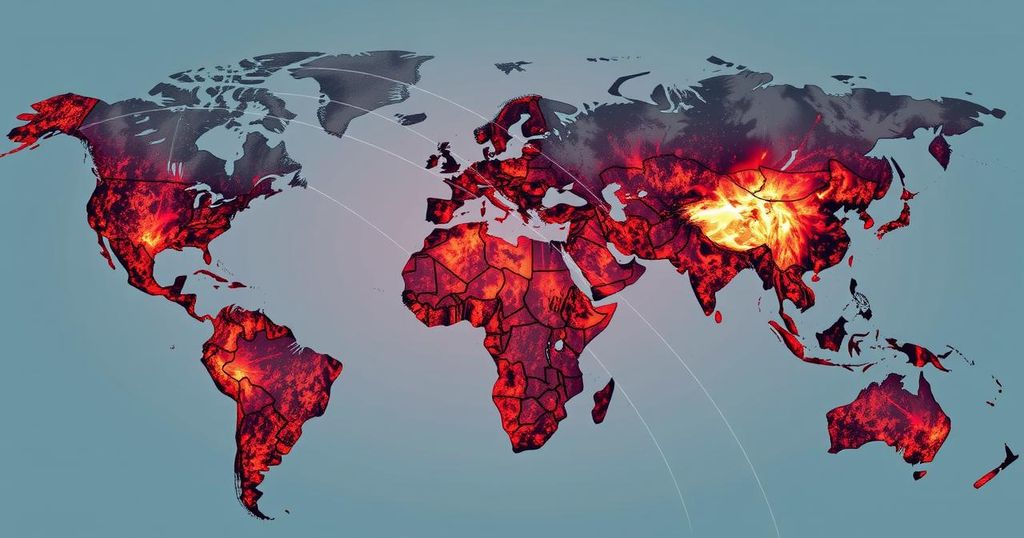The year 2024 saw numerous devastating events, including earthquakes, landslides, hurricanes, political unrest, and severe weather that collectively resulted in significant loss of life and widespread destruction across the globe. Major incidents included the Noto earthquake, Hurricane Helene, and the political turmoil in Bangladesh. These occurrences highlighted the urgent need for improved disaster preparedness and sustainable governance practices.
The year 2024 was marked by a series of catastrophic events that profoundly affected communities across the globe. These included devastating natural disasters, human-induced tragedies, and ongoing conflicts that underscored the vulnerabilities societies face amidst environmental and political turmoil. From earthquakes to political unrest, the implications of these tragedies resonate far beyond the immediate impacts, calling for urgent discourse on disaster preparedness, political stability, and humanitarian efforts.
On January 1, 2024, a significant earthquake rocked Japan’s Noto Peninsula, resulting in infrastructure damage and over 280 fatalities. This tragedy demonstrated the continuous risks associated with geological activities in the region and highlighted an urgent need for improved disaster response mechanisms.
In Ethiopia, heavy rains triggered catastrophic landslides in the Gofa region on July 21 and 22, burying several villages and leading to approximately 250 deaths, alongside countless displacements. The tragedy emphasized the acute consequences of environmental degradation and reinforced the necessity for sustainable land management practices in vulnerable regions.
Kerala’s Wayanad district experienced similar devastation on July 30, as monsoon rains induced deadly landslides, claiming 254 lives and leading to extensive property loss. The incident tested local disaster preparedness systems amid escalating occurrences of severe weather events.
September brought Hurricane Helene, which wreaked havoc on the southeastern United States, resulting in at least 235 fatalities and substantial property damage, marking it as the deadliest hurricane since Hurricane Katrina. In December, Cyclone Chido struck Mozambique, causing severe devastation and impacting over 622,000 individuals, with 94 confirmed deaths.
Human-induced tragedies also characterized 2024, notably illustrated by a tragic shooting at a concert hall in Moscow on March 22 that resulted in 154 fatalities and over 500 injuries. This incident elicited national outrage and was classified by authorities as an act of terrorism.
Bangladesh faced turmoil throughout the year, with ongoing protests against a contentious reservation law leading to approximately 650 deaths and the eventual fall of Prime Minister Sheikh Hasina’s government in August, followed by the swearing-in of new leadership.
The year was further marked by extreme weather events, including a record heat wave in Las Vegas that saw temperatures reach approximately 50 degrees Celsius, leading to around 342 heat-related fatalities. The annual Hajj pilgrimage faced a severe heat wave from June 14 to 19, resulting in over 1,300 heat-related deaths, prompting calls for improved infrastructure to protect large gatherings during such events.
Significant aviation disasters were rampant in 2024; a collision on January 2 at Japan’s Haneda Airport claimed five lives. On August 9, Voepass Linhas Aéreas Flight 2283 crashed in Brazil, resulting in 62 fatalities. A December 25 incident involved Azerbaijan Airlines Flight 8243, allegedly downed by a missile, resulting in 38 deaths.
The events of 2024 are reflective of a complex interplay between natural phenomena, human activities, and systemic vulnerabilities within societies. The increasing frequency and intensity of natural disasters underscore the critical importance of effective disaster management and environmental sustainability. Concurrently, the social and political unrest observed in certain regions denotes the urgent need for stability and governance that can withstand challenges from both external and internal frontiers. These evolving crises necessitate coordinated global efforts to enhance preparedness, protect human life, and advance recovery protocols across communities.
In summary, 2024 was characterized by a multitude of tragedies that emphasized both the fragility of human life amidst natural disasters and the catastrophic consequences of human actions. The extensive loss of life, destruction of infrastructure, and societal upheaval serve as reminders of the ongoing need for enhanced disaster preparedness, sustainable practices, and diplomatic resolutions to ongoing conflicts. As we reflect on this tumultuous year, it becomes clear that proactive measures are essential to mitigate the effects of future calamities.
Original Source: www.business-standard.com






